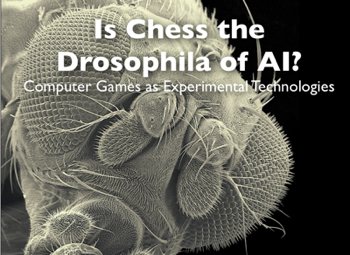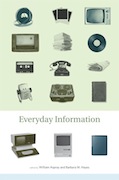Computers, Ethics, and Society
March 01, 2011 #teaching

This summer I will be teaching once again my course on contemporary issues in computer culture and policy. The course explores the various social implication of information technology: social, cultural, political, and economic. By considering by a wide variety
of perspectives on the Information Revolution, we examine the relationship between new information technologies and changing notions of community, identity, property, and democracy. Topics will include intellectual property
rights, Linux and the free software movement, cyber libertarianism, and the rise
and fall of the dot.com economy.
Download the most recent version of the STSC 465 syllabus in PDF form
Stanford University: Making Programming Masculine
February 26, 2011 #media
On February 28 I will be giving a talk at Stanford on gender issues in the history of the computing professions. The seminar is being jointly hosted by the program in Science, Technology, and Society (STS), the History and Philosophy of Science and Technology (HPST) Program, and the Clayman Institute for Gender Research.
More details available here, and the full winter schedule for the STS seminar series is here.
Postscript: Although most academic talks go relatively unnoticed, in this case I got a nice write-up in the local newspaper. The slides from the talk are now available online.
Cyberculture
January 27, 2011 #teaching

Free speech, free software, MOOS, MUDs, anime and cyberpunk. All of these are elements of a broad set of social, technical and political phenom- ena generally associated with the emergence of a nascent “cyberculture.” In this seminar we explore the ways in which recent developments in information technology – the computer and the Internet in particular – relate to changing contemporary notions of community, identity, property, and gender. By looking at an eclectic collection of popular and scholarly resources, including film, fiction and the World Wide Web, we will situate the development of “cyberculture” into the larger history of the complex relationship between technology and Western society.
Sports Fans and their Information Gathering Habits
January 27, 2011 #publications
Last year I worked with two students at the School of Information at Indiana University on a piece called “Sports Fans and their Information Gathering Habits: How Media Technologies Have Brought Fans Closer to Their Teams Over Time.” The piece has just been published in a collection edited by William Aspray and Barbara Hayes called Everyday Information: The Evolution of Information Seeking in America.
Our contribution to the volume provides an overview of sports media in the United States over the 19th and 20th century, and focused specifically on the emergence of fantasy sports leagues.
Is Chess the Drosophila of AI?
January 27, 2011 #media #research

A couple of years ago I presented a paper at the University of Minneapolis on my ongoing research project on computerized decision models. Although the paper was ostensibly about computer chess, the talk took a conceptual turn, and focused on what I am calling the “politics of the algorithm.”
Since then I have given several different versions of this talk
The chess project will soon be published in the Social Studies of Science. In the meantime, here are the slides from the talk (recently updated), which I am posting as part of experiment in making aspects of my academic research more widely available.
The Computer Boys have a website!
November 21, 2010 #publications

Actually, the computer boys have lots of websites. But my book, The Computer Boys Take Over Computers, Programmers, and the Politics of Technical Expertise now has its own website.

